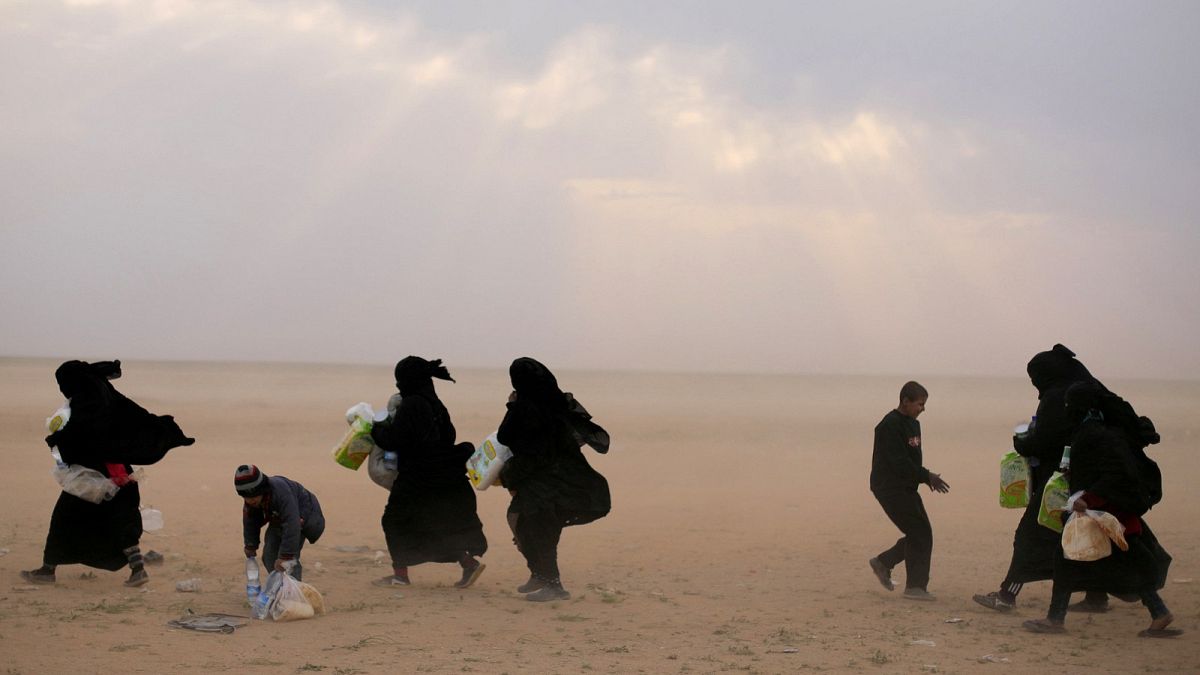Families from Islamic State are surrendering in refugee camps in Syria and Iraq. These families are not wanted by the world; many are not even seen as human. But should innocent children pay the price for their parents actions?
The women here are sick, tired, afraid and worried. Others are injured, utterly at their wits' end or in mourning. All they have is the children they are with, and all they want is the children they are not with.
When you ask a woman how many children she has, it’s always minus one or two. Her other kids died, so they answer by saying: “I have four kids but only three are here.”
The families gathering in the displaced camp at Al-Hol, in eastern Syria near the border with Iraq, are arriving as territory controlled by the Islamic State group gets smaller. These families are not wanted by the world; many are not even seen as human.
The children in particular are in limbo; no schooling, limited heath facilities, a dim future. They did not choose to come here. They did not choose to be put into this position, and it is my hope that they will not be heavily penalised in the long-term for the decisions of their parents.
The stories the mothers here told us were awful. How families had to avoid sniper fire while traveling at night. How one child saw something on the ground he thought was food so picked it up; it was a mine that blew both of the child’s legs off.
One person told a story of a pregnant woman who was fleeing through a mine field when she stepped on one of the explosive devices. Her body, wounded and in shock, reacted by going into labour. It was a searing moment, something that no pregnant woman should ever, ever experience.
I’ve travelled often to northeastern Syria. I have spoken to many men and women in those camps. We’ve delivered thousands of Red Cross Messages – letters to family members -- and listened to people’s pain, with limited tools to alleviate it.
My most memorable conversation was with one woman who opened up as if we were long-time friends. I have visited her country on holiday and nothing in Al-Hol resembles it. She had much to say. It wasn’t chronological but a conscious flow - and I listened. She needed to speak to someone who started not by asking her last name, first name and date of birth. We shared a human connection in that moment, and I think that’s what the people here need – someone to listen and not judge.
One lady told me she hasn’t seen potatoes in four months. Some of them told me they were boiling grass and making soup with it.
All of them said they were trapped inside a world where they held no power. They saw we were not there to judge, and I think that’s one of the great things that the International Committee of the Red Cross (ICRC) is able to bring to these families. We care regardless. We view people as people. And if they are in need, we try to assist.
We heard the same questions repeatedly: ‘Do you think my country will forgive me?’ ‘Do you think I can return? My children need to go to school.’
Half a dozen ICRC delegates spoke with people in the camp for over the course of a week, listening to their most pressing needs and working to connect them to relatives they lost touch with. Some of these relatives are still somewhere in Syria or Iraq, others are scattered around the world. Our next steps: trying to find their relatives with the help of the ICRC and Red Cross/Red Crescent societies, making sure they receive the amount of food they need and a shelter, as well as have access to healthcare.
The cold here is biting. More than two dozen children are reported to have died due to the cold in recent weeks. People are bundled in clothes, as they have no place indoors to go to. Some don’t even have tents and remain vulnerable to the hazards of the climate.
The ICRC is distributing thousands of bottles of water a day and we’re bringing in tents. We’ve also built a kitchen and recruited cooks to provide meals. Sometimes people in distress just really need a hot meal to keep themselves going.
We are also working to find information on family members that were left behind, often husbands, brothers and sons. There are tens of thousands in this camp and almost no men over the age of 16. That’s a lot of separated family members to track down.
The fate of these families - from Europe and elsewhere - hangs in the balance. Countries of origin cannot turn their backs. People cannot be made stateless or left in limbo. Security and accountability are important but so is treating people humanely.
I’ve been to a lot of camps as a delegate for the ICRC. Often I have seen people in need of food or water more than anything. This was one of the rare times where the need for news about family was almost more important than the need to eat.
They’ve lost so much and now all these women have left are the children they have with them. That’s the most precious thing; that’s their coping mechanism. The children here did nothing wrong. The mothers are hoping against hope that they can have a future.
Jean-Nicolas Paquet-Rouleau is the Deputy Head of Delegation in Syria for the International Committee of the Red Cross
